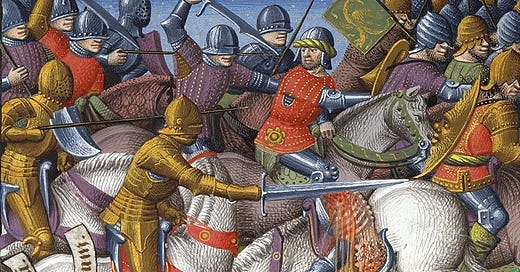If you are looking for the beginning of the study for The Song of Roland then you can go HERE for a brief introduction. At the bottom of the introduction you will find the links to each section of the study guide as it becomes available. If you would like to see the growing list of book studies available for free on this site you can go HERE. Enjoy!
Virtues/Vices/Great Ideas: (Find them in the Text)
Recklessness, Betrayal, Pride
Grammar Questions: (The Information of the Text)
What honor did Marsilion’s nephew ask to receive?
After Marsilion’s nephew was granted his first request, what second request did he make?
What unique knowledge did King Corsablis have?
What impressive ability is ascribed to Malprimis?
What one quality did the Emir lack which would have made him “right knightly” in his appearance?
What was Margaris of Seville known for in particular?
How is Chernubles of Munigre described?
What was Roland’s response to Oliver when he said, “I think…We’ll need this day with Saracens to fight”?
What did Oliver plead three times that Roland ought to do?
What qualities of character are ascribed to Oliver and Roland in the text in the last Laisse of the reading?
Logic Questions: (Interpreting, Comparing/Contrasting, Reasoning)
Why did the paynims pick twelve men to rival the twelve peers?
Why are the descriptions of the twelve “anti-peers” important to the story?
How did Oliver know that Ganelon had betrayed them when he saw the paynim army?
Why wouldn’t Roland allow Oliver to say anything against Ganelon?
Why wouldn’t Roland blow his horn to call for aid despite Oliver’s three-fold plea?
Rhetoric Questions: (The Analysis of Ideas in the Text)
Imagine for a moment that you are Roland’s lawyer and you have to defend his decision not to call for aid. How might you do it? What can you say in favor of his decision to not call for help? Make sure to use the text in your answer.
Now you are the prosecutor, how would you attempt to destroy the case you just made in defense of Roland? Again, reference the text in your answer.
Theological Analysis: (Sola Scriptura)
Read Matthew 10:1-4. How might we connect this passage to our present story?



